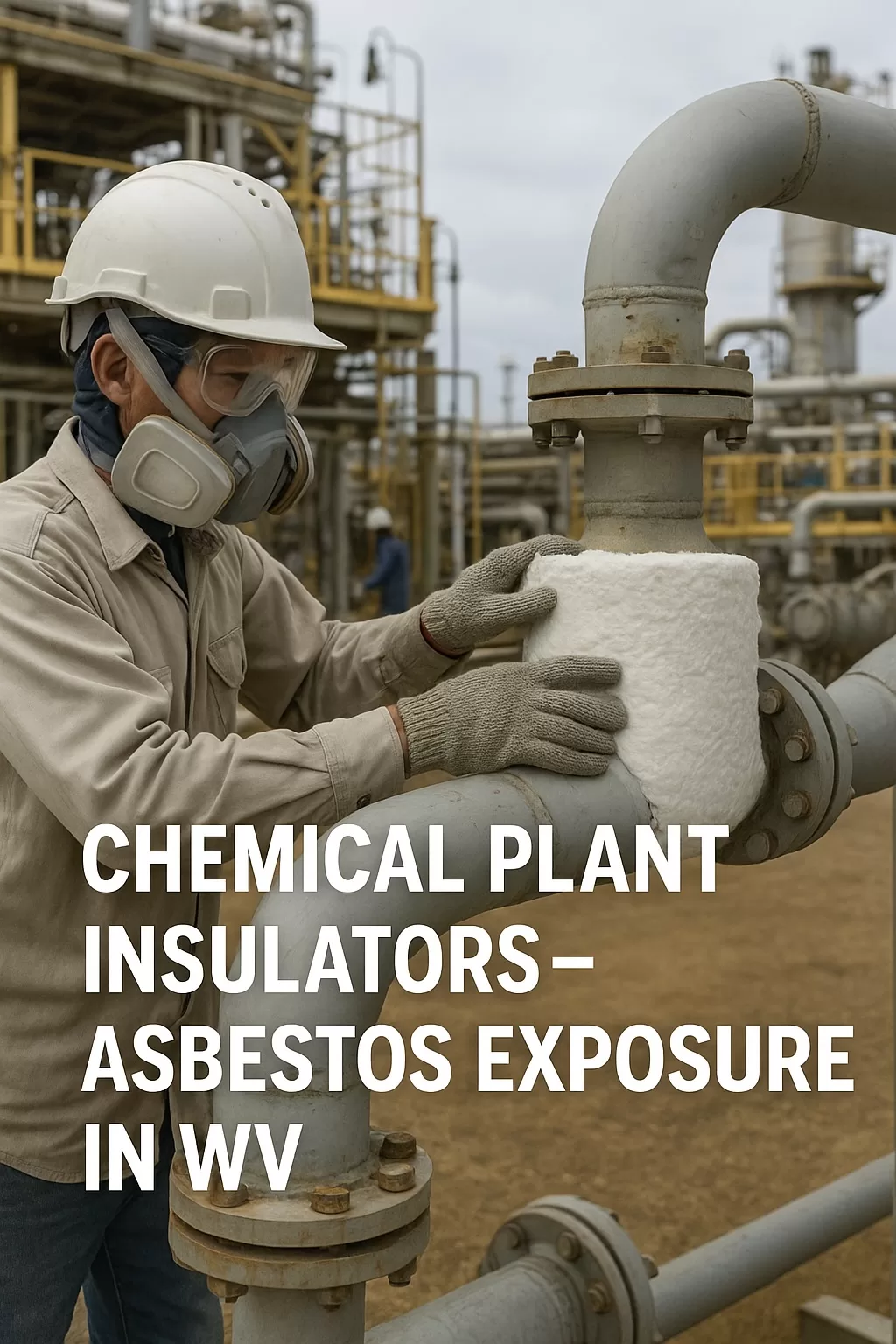Chemical plant insulators in WV were among the most heavily exposed workers in the state’s industrial workforce. From Nitro to Belle to South Charleston, insulation trades were critical to operations in West Virginia’s massive chemical facilities. Unfortunately, many of these workers handled asbestos-based materials daily—without adequate warnings or protective gear. Today, many are facing life-altering diagnoses of mesothelioma, lung cancer, or asbestosis as a result.
If you or a loved one worked as an insulator in a West Virginia chemical plant and have since been diagnosed with an asbestos-related illness, you may have a strong legal claim for compensation.
Why Chemical Plant Insulators Faced Asbestos Dangers
The job of an insulator involved wrapping, spraying, and cutting insulating materials around high-temperature systems—often piping, valves, boilers, and reactors. Prior to the 1980s, almost all insulation materials contained asbestos.
Common asbestos products used by insulators included:
- Block insulation for heat exchangers and vessels
- Pipe covering and elbow joints
- Asbestos cloth, blankets, and wraps
- Cement and muds used to seal fittings and flanges
- Spray-applied fireproofing and refractory linings
Even short-term work inside chemical facilities exposed insulators to airborne fibers that remained trapped in the lungs for decades before causing disease.
West Virginia Chemical Plants with Known Asbestos Risks
Numerous chemical processing sites across West Virginia had asbestos hazards, including:
- Union Carbide – South Charleston, Institute, and Alloy
- DuPont – Belle Works and Washington Works (now Chemours)
- FMC Corporation – Nitro and South Charleston
- Monsanto – Nitro
- American Viscose – Nitro and Parkersburg
- Olin Corporation, BASF, and GE Chemicals
Insulators often worked alongside pipefitters, boilermakers, and millwrights during shutdowns and maintenance periods—further compounding exposure risks in boiler rooms, powerhouses, and acid units.
👉 Search Asbestos Job Sites in West Virginia
Legal Options for Chemical Plant Insulators in WV
If you or a family member worked as an insulator in a WV chemical plant and now face a diagnosis like mesothelioma, you may be eligible for:
- Asbestos trust fund compensation
- West Virginia asbestos lawsuits
- Wrongful death claims for surviving family members
Asbestos cases in West Virginia follow a streamlined legal process, and claims can sometimes be resolved in less than a year. Early legal action also preserves your rights before statutes of limitations expire.
Families Deserve Justice — Even for Take-Home Exposure
Take-home exposure was also common in insulation trades. Spouses who laundered dusty work clothes or children who hugged their fathers after shifts may now be suffering the consequences of secondhand exposure decades later.
If your loved one never worked in a chemical plant—but lived with someone who did—you may still have a claim.
Talk to a West Virginia Lawyer Who Understands Insulator Cases
Attorney Lee W. Davis has represented West Virginia asbestos victims and their families for over 25 years. From Nitro to Charleston to Parkersburg, his experience spans nearly every major chemical site in the state. Whether you’re filing for yourself or a loved one, we offer personalized, local help—not out-of-state call centers.
Call (412) 781-0525 or fill out the secure form below to get started.
Check If Your Family Was Exposed
Get your free guide instantly + a confidential case review.
🔒 100% Confidential. No obligations.
FAQ – Chemical Plant Insulators WV
What types of asbestos products did insulators use in WV chemical plants?
Insulators used asbestos-containing pipe wrap, block, cement, and spray-on fireproofing, all of which released fibers when cut or handled.
Can family members of insulators also file asbestos claims?
Yes. Take-home asbestos exposure claims are valid in West Virginia and may be filed by spouses or children exposed through contaminated clothing.
How long do I have to file a mesothelioma claim in WV?
West Virginia generally allows two years from the date of diagnosis or death to file a lawsuit. Trust fund deadlines vary.

